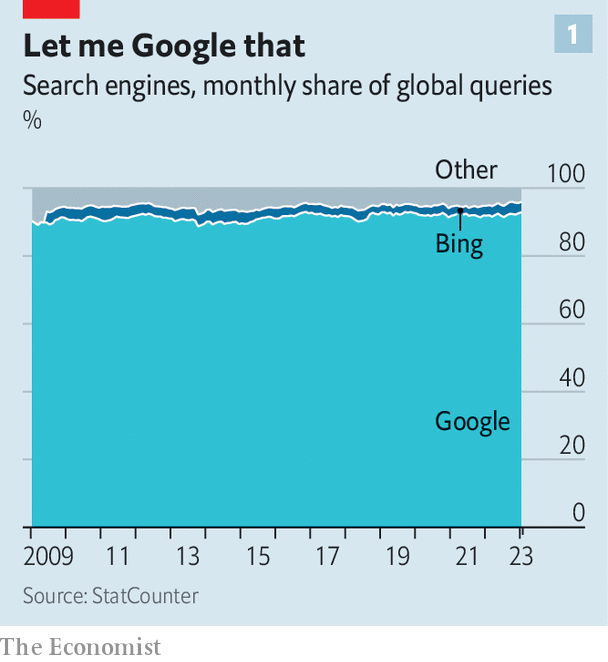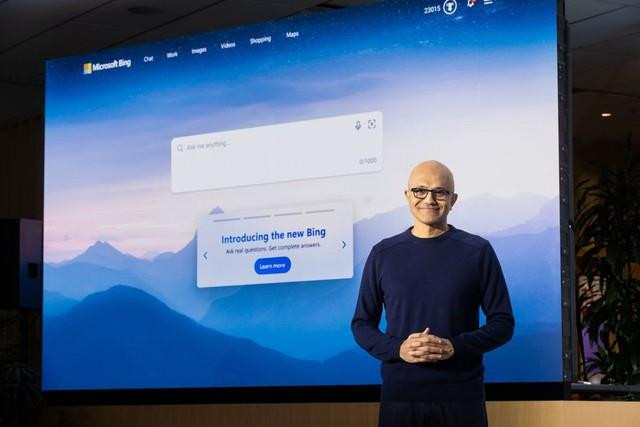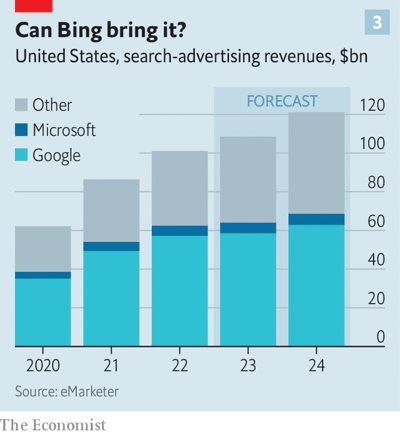ChatGPT is making Google gradually lose its monopoly position for 20 years?
- Tram Ho
Google owns the most viewed search engine and has been at the top of this market for two decades. This also becomes the door to attract countless advertising customers. Google processes about 100,000 searches per second and produces a long list of relevant results thanks to its intelligent algorithm.
This tool has gradually turned Google into a verb in everyday life. According to Forbes, “Google” has been recognized as a phrase in the Merriam-Webster dictionary.
Users come back because of the accuracy of the search results and this has prevented the competition of other competitors. All other search engines combined account for about a tenth of Google’s total daily searches, The Economist reports.

Market share of online search segment of Google and Bing. Photo: The Economist
Advertisers spend large sums of money to reach Google’s user base and are usually charged only if there is a website visit. Revenue for Alphabet, Google’s parent company, has grown by an average of 20% a year since 2011. During this period, the company raked in more than $300 billion after deducting operating costs.
Alphabet’s market value also tripled to $1.3 trillion, making it the 4th most valuable company in the world. Unlike Apple, Microsoft or other tech rivals, Google has no incentive to change, according to The Economist.
Google’s dominance is being challenged
But now, everything has changed. OpenAI’s Chatbot AI ChatGPT made Google CEO rush to issue “Code Red” for the entire company right before Christmas.
In addition to being able to chat like humans, ChatGPT and chatbots like it can compose poetry, write essays, write code, and more. Billionaire Bill Gates, co-founder of Microsoft, also affirmed that this technology is “as important as computers or the internet”.
Eric Schimidt, former CEO of Google, called ChatGPT “the first visual example” of a future human AI friend. He also said that this is the most visual threat to Google’s search dominance because the chatbot can answer the kinds of questions that users often ask Google.
Besides, OpenAI, the company that develops ChatGPT, has cooperated with Microsoft since 2019 with an investment of 1 billion USD. On February 7, Microsoft also announced that it would invest another 10 billion USD in OpenAI and publicly “declared war” on Google. Microsoft CEO Satya Nadella affirmed: “The AI race starts today”.
Also on February 7, Microsoft released an improved version of the Bing search engine. Bing has its own chatbot based on OpenAI’s models. “This is a new era in search,” said CEO Nadella.

Microsoft CEO Satya Nadella introduces the Bing search engine with ChatGPT integration. Photo: Microsoft
“In a hurry” to compete with ChatGPT, Alphabet also introduced a new chatbot called “Bard” on February 8, a day after Microsoft’s event. Along with that, Alphabet also announced a $300 million investment in Anthropic, an AI startup.
The company confirmed Bard will be integrated into the search engine in the coming weeks. Investors were unimpressed, however, and Alphabet’s stock price fell 8% in trading that same day.
Online search has been around since the end of the 20th century with tools like Yahoo, AltaVista… But Google is the company that revolutionized online search when it ranks websites based on relevancy. related to the searched keyword.
In the last few years, many Google competitors have emerged. Some startups offer ad-free search, like Neeva. Other competitors include competitors from the Big Tech group.
Amazon’s U.S. search ad market share has grown from 3% in 2016 to 23% in 2022. Apple’s search ad business, which includes iPhone app search, now accounts for 7% market share. .
According to eMarketer, Google’s share of search advertising in the US is forecast to drop from 67% to 54% in 2023.
Why is Google “afraid” of chatbots?
ChatGPT works by predicting the next word in a sentence until an answer is completed. These predictions are based on a large linguistic model (LLM), the result of analyzing millions of texts on the internet.
Once trained on all these natural languages, the chatbot can fluently give written answers instead of just giving a list of links like Google.
For example, when searching for tourist attractions that are reasonably priced, kid-friendly, and educational, users have to go to Google to search for travel blogs, related posts, and conduct comparisons. compare.
However, ChatGPT makes pretty good choices in a matter of seconds. Users can then ask for more detailed information to suit their wishes.
Changing the way people search, in turn, also changes what they look for. Like finding information, users can use conversational search until the desired result is achieved.
” Using all these resources to compete with Google would cost around $10-30 billion ,” according to UK analysis firm Competition Markets Authority.
Currently, Bing’s market share in the US search advertising space is 5%. Microsoft hopes to change that number. This company seems to be trying to refine ChatGPT’s vulnerabilities by upgrading it.

Google and Bing’s US search advertising revenue. Photo: The Economist
Brian Nowak, Morgan Stanley, estimates that it costs about 2 cents for ChatGPT to provide an answer, 7 times more than a Google search. He also estimates that for every 10% of Google searches that are turned over to AI for processing by 2025, the company will spend an additional $700 million to $11.6 billion.
Microsoft is betting that a chatbot-powered search engine will attract more new users to Bing. But they will also have to sacrifice profits, at least until they figure out how to reduce operating costs, or by taking market share away from Google.
” For every 1% increase in our share of online advertising, our advertising revenue will increase by $2 billion ,” said Philippe Ockenden, Microsoft financial analyst.
Reference: The Economist
Source : Genk
